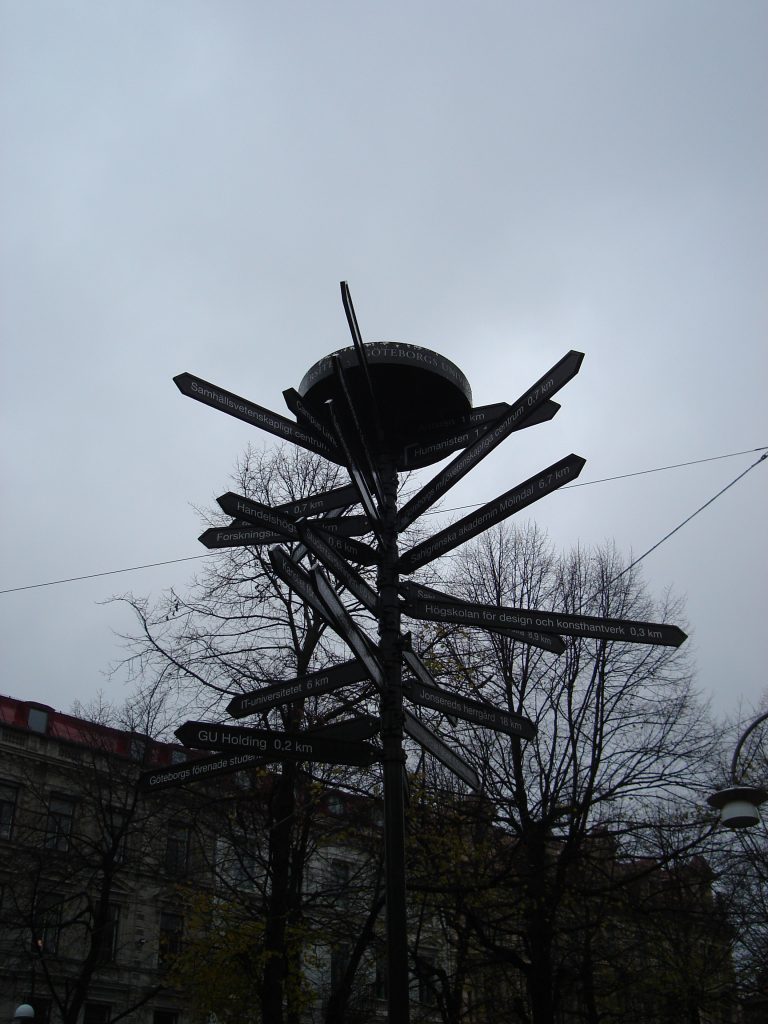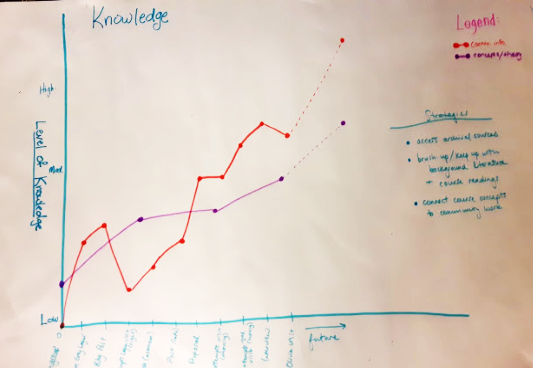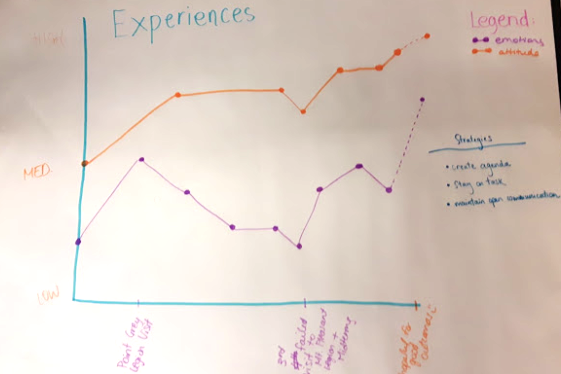Weekly Objectives
- Look into conducting archival research on the Mt. Pleasant Legion Branch in order to diversify the data for our project.
- Begin to work on the final community project report, focusing on areas that we are already able to complete, including:
- Introduction (drawing on proposal and new information)
- Methods (including the analytical framework that we will be applying)
- Results (infer from any archival research conducted)
Achievements
- Winnie met with Isabel and Gordon, the Legion’s branch manager and administrator respectively, and introduced our group project to them. They were more than willing to participate in interviews and also invited us to join them at their general meetings to converse with and interview branch members. Unfortunately, we were unable to make it to the closest general meeting as it was so last-minute, so we paid a visit during the week of our Flexible Learning session. However, since it is nearing Remembrance Day, the Legion is very busy and Isabel was unable to find time to sit down for an interview.
- We curated a list of interview questions to ask the Legion branch manager and their members.
- Our team has demonstrated positive work ethic and effective communication thus far.
Reflection on Our Group’s Moment of Significant Change Workshop
After several failed attempts to reach a Legion staff member, we were elated to finally be able to establish a connection on our fourth try. Winnie was able to meet the Legion branch manager and administrator who expressed interest in participating in our project and partaking in interviews.
When two of our group members arrived at the Legion a week later and were prepared to sit down with the community stakeholders to connect and gain a better understanding of the Legion and its food system, they were unfortunately turned away and were told to come back two weeks later when the Legion staff had more time for us. This was disappointing because it was another unsuccessful visit where we were unable to complete our goals, despite being prepared. Furthermore, we somehow felt like our visit was a burden to the Legion manager who seemed too busy to be in contact with us.
Every experience our group has had at the Legion has added to what Shulman (2005) describes as a cycle of “uncertainty and resolution”. Due to the unpredictability of trying to collaborate with the Legion during a busy time of the year, we needed to make adjustments to the methods and plans originally set in our proposal. The “aspects of reality” of our community-based research did not align with our initial expectations. Instead of being able to set definite objectives and a timeline as we had hoped, we had to adapt to working with uncertainty. However, working through the process of realigning our project as a team has helped us overcome our feelings of frustration from failing to conduct our research and interact with the Legion in the way we expected to. Adjusting our methods has demonstrated how initial failure has molded our project for the better, just as the Freakonomics Podcast “Failure is Your Friend” illustrated. By interacting with the Legion on their terms, it also shows that we are willing to listen, and that we acknowledge and respect the role they play in their community, both of which are important foundations to asset-based community development.
Moreover, the very slow start that we’ve had as a group to make any connection with our community partner has shown us the true nature of what community-based research is. Believing that everything will progress according to our proposal is overly optimistic. The trials we’ve had in the process thus far are reminiscent of Dan Barber’s many attempts at making ethical foie-gras, a featured story in This American Life’s “Latin Liver” podcast. The podcast implied that even with the confidence of having the information and tools he needed to accomplish his endeavor, Dan was still unable to get the outcome he desired three years down the line. In our group’s case, we certainly hope we don’t get held back for such an extended period of time. However, we will keep an open mind in the off chance that our current methods do turn out to be ineffective in achieving our goals, and we will stay positive while we change and modify our plans so we can continue on. We have only been set-back by a couple of weeks at this point and, thankfully, our group has a healthy and optimistic team dynamic that has been crucial in shaping our responses to the challenges we’ve faced so far.

If one direction that we’ve taken doesn’t work out, we’ll keep an open mind and try other directions. Photo Credit: CC image courtesy of Mike Linksvayer on Flickr
Our graphs that were drawn during the Moment of Significance workshop show the ups and downs of our experience thus far in completing this community-based research project. There was never a fixed period of time where we felt continuously great about our knowledge, skills, and experiences. On our Knowledge graph, for example, the first peak along the ‘community information’ curve (red) occurred when our group got together to write the first blog post. We felt confident in our preliminary knowledge about the direction of our project. The first trough we encountered came shortly after when we were unsuccessful in entering the Legion premises for the first time. Our knowledge significantly increased to the second major peak when Winnie successfully met with the Legion branch manager and obtained a small amount of information about the Legion’s programs and facilities. It has since hovered around this second peak as we have been unsuccessful thus far in conducting a formal interview with the Legion and so, have been unable to obtain any further information. Our knowledge of ‘course concepts and theories’ (purple) on the other hand, has steadily increased as the course has progressed.

Our Moments of Significant Change graph depicting the group’s change in knowledge level over the course of the project (solid line), and where we’d like to end off (dotted line). Community information is in red, and course concepts and theories in purple
Similarly, there were a number of ups and downs on our Experiences graph, with one notable dip along both the ‘emotions’ (purple) and ‘attitudes’ (orange) curves. This resulted from our third experience in which we failed to connect to someone from the Legion and visit the space. We had high hopes for the majority of this experience up to that moment, however failing for the third time severly decreased our confidence to complete this project successfully. There was renewed optimism when Winnie finally made contact with the Legion branch manager on our fourth attempt, but those hopes were dashed the following week when we our request for an interview was deffered to an undecided later date. Even so, our attitude is to stay determined and perserve through our failures. Our emotions however, have taken a disappointed hit, though we are hopeful they will rise significantly once we manage to conduct our interviews, even past our highest point so far which was after our visit to the Point Grey Legion where we came out feeling confident and excited about meeting our own legion.

Our Moments of Significant Change graph depicting the positivity level experienced by the group over the course of the project (solid line), and where we’d like to end off (dotted line). Emotional level is in purple, and attitude level is in orange.
While we’ve had quite a few lows so far during our project, we realize that every time our spirits were dampened we ended up growing tremendously from the experience. This is evident in our graphs and further highlights the importance of failing. Without failing, we wouldn’t have had the ability to learn from the situation and then improve on our work so we can ultimately have a better final report.
Strategy for Successful Project Completion (the Graceful Dismount)
In order to achieve success in our project, we created strategies that would help us get there. We aim to increase our conceptual knowledge and further deepen our insight about different food justice concepts relating to our community-based project by keeping up with background academic literature and course readings, continuing to connect course content to our experiences, and accessing archival sources in order to further explore the history our Legion
Since our struggles with reaching out to the Mt. Pleasant Legion has pushed our initial timeline back, it is essential that we make good use of our free time right now to prepare for our upcoming tasks. For example, we hope to assess archived information to learn and understand more about our Legion’s past as an active organization in the Mt. Pleasant community. This will better prepare us for when we write our final project report as we can link historical facts into our paper, and for when we interview Legion staff and members. To accomplish this, we intend on creating an agenda of our plans and goals for each week starting from now until the end of the course. We also commit to maintaining a positive attitude, and constantly practicing open and healthy communication among group members so as to ensure we are all making the most out of this community-based learning experience.

Time to hit the archives and spend some time with the books! Photo Credit: CC image courtesy of TaraRoss7 on Flickr
As we prepare to finish our project, our group still has a substantial amount of work to complete. In the next three weeks of the project, we will have to conduct all of our interviews and analyze the qualitative data we receive from the Legion. Completing our project successfully will require us to critically decipher what the most important lessons we gathered from interviews are, and how to present our findings in the most coherent and engaging manner. As the semester comes to a close, our individual work loads will likely increase and it is vital that we maintain effective communication as well as time-management in order to stay organized, reduce any stress burdens and produce a final report and poster that we are all proud of.

Our planners will be especially important in helping us stay organized. Photo Credit: http://barnimages.com/
Due to this, it is essential that we continue to have high energy levels and positive attitudes in order to complete our project successfully. Hopefully this will enable us to reach the anticipated levels of knowledge and experience that we predicted in our graphs from the Moment of Significant Change workshop (dotted line segments of the graphs).
References:
Shulman, L. S. (2005). Pedagogies of uncertainty. Liberal Education, 91(2), 18–25. Retrieved from http://files.eric.ed.gov/fulltext/EJ697350.pdf